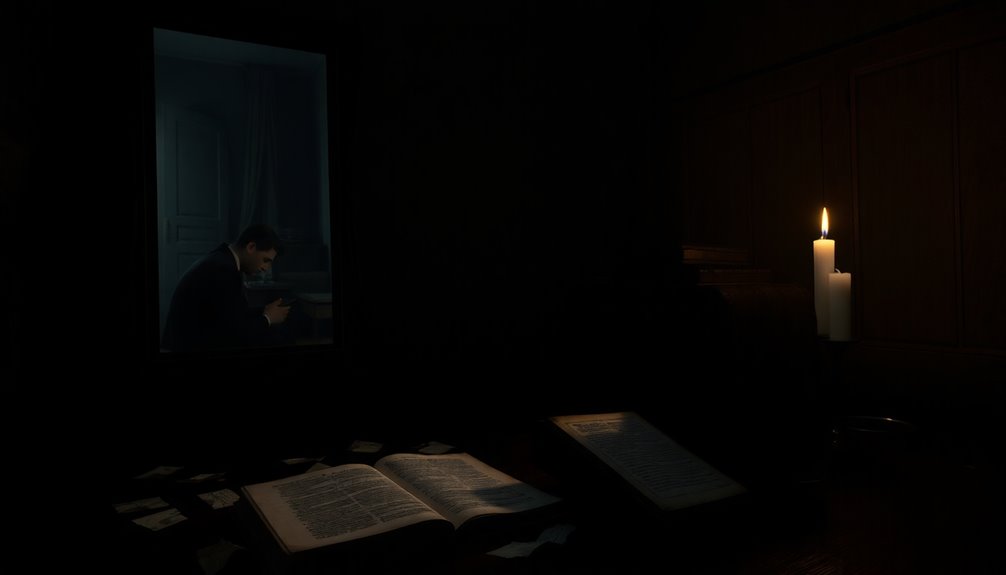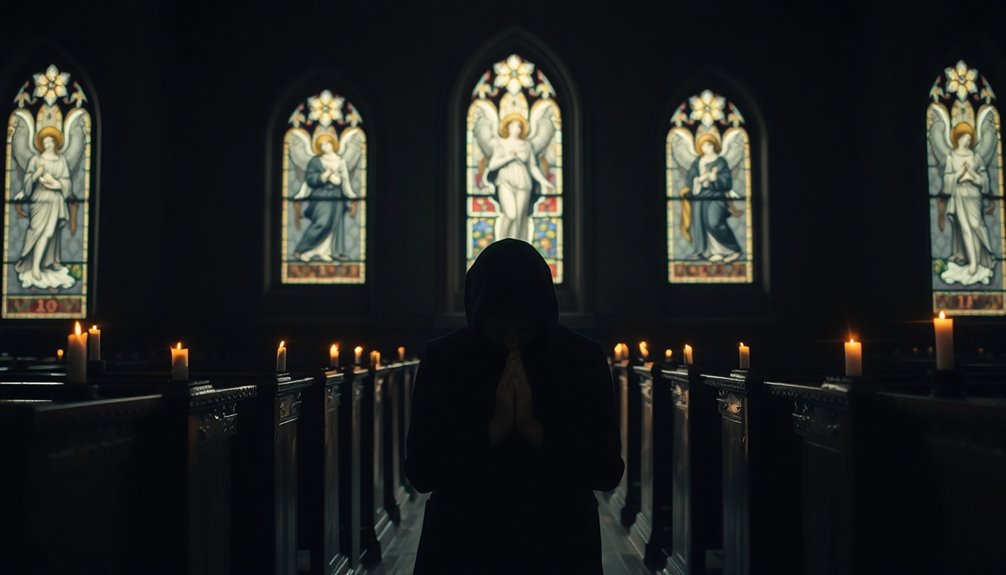In many religious traditions, especially Christianity, suicide is often viewed as a sin. Historical councils have condemned it, labeling it a grave moral failing, which complicates discussions about divine forgiveness. While the Bible doesn't explicitly list suicide as an unforgivable sin, it raises important questions about accountability and mercy. Those struggling may feel overwhelmed by loneliness or hopelessness, but recognizing these feelings is vital. Many individuals find support through faith-based communities and resources that emphasize understanding over judgment. There's much more to explore about the intersections of faith, mental health, and the complexity surrounding this serious issue.
Key Takeaways
- Many religious traditions, particularly Christianity, view suicide as a sin, often linked to the concept of self-murder.
- Historical councils condemned suicide, leading to prohibitions on religious funerals for suicide victims and labeling it a grave moral failing.
- The Bible does not explicitly classify suicide as an unforgivable sin, suggesting the potential for God's mercy with true repentance.
- Cultural beliefs often stigmatize mental health issues, complicating discussions around suicide and contributing to misconceptions about its causes.
- Acknowledging the emotional pain behind suicide is crucial for understanding, fostering compassion, and providing effective support for affected families.
Introduction

Suicide has long been viewed through the lens of sin within many religious traditions, particularly in Christianity. You might find it unsettling that suicídio is classified as pecado, reflecting a belief that life is a sacred trust from Deus, not merely a personal possession.
Historical church councils, like the Council of Arles, condemned suicide as a grave sin, enforcing prohibitions on religious funerals for those who took their own lives. This raises significant issues regarding moralidade and the implications for one's consciência at the moment of death.
While some papal statements, including those from Pope Benedict XV, indicate that funerals may be permitted for individuals deemed insane or who showed signs of arrependimento, questions remain about the opportunity for forgiveness.
The belief that suicide equates to self-murder complicates discussions on perdão, as it challenges the notion of repentance. If someone doesn't have the chance to seek forgiveness before their final moments, how does that affect God's julgamento?
Your understanding of these complexities can help navigate the difficult terrain of faith and mental anguish, fostering a deeper trust in the divine nature of mercy and understanding.
Scriptural Insights on Suicide

When you explore scriptural insights on suicide, you'll find both primary and secondary Bible references that shed light on this complex issue.
These passages can help clarify the gravity of the act and the nuances of forgiveness.
Understanding these scriptures might offer you a deeper perspective on the moral and spiritual implications of suicide.
Primary Bible References
Numerous biblical passages provide insight into the complex issue of suicide, revealing both the struggles faced by individuals and the broader theological implications. The Bíblia doesn't explicitly label suicídio as an unforgivable pecado; rather, it emphasizes that blasphemy against the Holy Spirit is the only sin that can't be forgiven (Matthew 12:31-32).
This perspective invites a deeper look at figures bíblicas like Elijah and Job, who both faced desespero and wished for death in their darkest moments (1 Kings 19:4; Job 3:11-12).
The Apostle Paul also shared his own struggles with despair, reminding you that even believers confront overwhelming challenges (2 Corinthians 1:8).
King Saul's suicide in 1 Samuel 31 raises essential questions about the fate of those who take their own lives, as he was a believer who chose to end his life.
However, Scripture assures you of Deus's misericórdia and perdão, emphasizing that all sins can be forgiven with true arrependimento (1 John 1:9).
Ultimately, your faith in Christ is what matters most, rather than the specific actions you've taken.
Secondary Bible References
The Bible provides various insights that can help you understand the complexities surrounding suicide. While it doesn't explicitly label suicídio as an unforgivable pecado, it highlights that resisting the Holy Spirit is the only unforgivable sin (Matthew 12:31-32).
The stories of King Saul and Judas Iscariot raise important questions about the eternal fate of those who take their own lives.
However, the Apostle Paul's transformation serves as a powerful reminder that perdão is always possible, as he received forgiveness for his past actions (1 Timothy 1:12-14).
Biblical narratives, like those of David and the thief on the cross, show that fé and arrependimento can lead to redemption, regardless of the severity of one's sins (Luke 23:42-43).
In moments of desespero and hopelessness, the Scriptures encourage you to seek God's comfort. Psalm 34:18 reassures that God is close to the brokenhearted, offering esperança in times of turmoil.
Ultimately, the Bíblia emphasizes that life is precious, and reaching out for support is crucial. Remember, your life and struggles matter deeply to Deus.
Historical Views on Suicide

Throughout history, various councils and religious authorities have condemned suicide, viewing it as a grave moral failing. The Council of Arles in 452 labeled suicídio as the greatest pecado, marking the beginning of a long-standing disapproval.
This perspective was echoed by the Council of Orleães in 533, which prohibited religious funerais for those who died by suicide, underscoring the severity of the act.
Further reinforcing this attitude, the Council of Braga in 561 denied funeral rites to individuals believed to be in full possession of their faculties at the time of their suicide. This indicated a strong belief in personal responsabilidade for such a decision.
The Council of Toledo in 693 took it a step further, instituting excomunhão for those who attempted but failed to commit suicide, showcasing just how seriously the Igreja regarded this issue.
Theological Perspectives on Suicide

Given the historical condemnation of suicide by various councils, it's important to explore how these views align with theological interpretations. The Igreja has long classified suicídio as a mortal pecado, rooted in the belief that taking one's life is a rejection of Deus's gift. This stance was reinforced by councils like Arles, which denied funerals to those who died by suicide if they were seen as fully aware of their actions.
In theological discussions, arrependimento plays a crucial role. Without the chance for repentance before death, the complexity of forgiveness arises. II Corinthians 5:10 emphasizes that everyone is accountable for their actions, posing difficult questions about salvation for those who commit suicide.
Historical figures, such as King Saul and Judas Iscariot, further complicate this debate, as they challenge our understanding of God's juízo concerning such acts.
While suicide is considered a serious sin, it's noteworthy that blasphemia against the Holy Spirit is viewed as the only unforgivable sin. This distinction suggests that, despite the grave nature of suicídio, there remains a possibility for mercy within the framework of Christian teologia.
Cultural Beliefs About Suicide

Cultural beliefs about suicide often shape how individuals perceive it, leading to misconceptions that can complicate understanding.
You might notice that in some societies, mental health issues are stigmatized, while others honor the act as a reflection of courage.
Debunk Common Misconceptions
While many people might think of suicide solely as a consequence of mental illness, this view oversimplifies a complex issue. The cultural stigma surrounding suicídio often leads to equívocos that can be harmful.
It's easy to label those contemplating suicide as irrational or weak, but this ignores the profound pain they may be experiencing. Life stressors, trauma, and a lack of apoio can significantly contribute to ideação suicida.
You might hear that suicide is an act of selfishness, but this perspective fails to consider the deep feelings of solidão and hopelessness that can distort a person's rationalidade. Many who struggle with these thoughts may appear composed, navigating their day-to-day lives while feeling trapped by their circumstances.
It's essential to recognize that choices made under extreme emotional distress are often not about weakness, but rather a desperate response to overwhelming pain.
Mental Health Considerations
Understanding the complexities of suicide often hinges on the cultural beliefs that shape our perceptions. In many societies, suicídio is viewed through a lens of pecado, where religious teachings label it a moral failing. This perspective can create significant estigma surrounding saúde mental, leading to misconceptions that equate suicidal thoughts with madness. Such beliefs can deter individuals from seeking ajuda, fearing judgment or ostracism.
The lack of apoio social often exacerbates feelings of isolamento, leaving individuals trapped in their struggles. In cultures where discussing mental health is taboo, a diálogo aberto is crucial. Without open conversations, those in need may suffer in silence, feeling like they've no one to turn to.
Effective intervenções require an understanding of these crenças culturais. Recognizing how societal views impact the willingness to seek help can guide supportive actions.
By fostering a culture that encourages open dialogue and values mental health, we can reduce stigma and create an environment where individuals feel safe to discuss their feelings.
Ultimately, addressing these cultural beliefs is key to offering compassionate support and promoting healing in our communities.
Support for Affected Families

When someone you love has died by suicide, it's essential to acknowledge the deep pain you and your family are feeling.
Finding empathy and understanding through support groups can help you navigate this grief together.
Faith-based communities also offer a comforting space, reminding you of the importance of healing and connection during such a difficult time.
Empathy for Survivors' Pain
Often, families left behind by a loved one's suicídio grapple with overwhelming emotions, including grief, guilt, and confusion. The pain they feel can be profound, often mixed with feelings of anger or betrayal towards the deceased.
This complex emotional response can make navigating the luto even more challenging. Unfortunately, the stigma surrounding suicídio can exacerbate their suffering, leading to isolation when they need apoio the most.
It's crucial for these sobreviventes to find spaces where they can share their experiences without fear of judgment. Open dialogue about saúde mental and the realities of suicide fosters compreensão and empathy, allowing families to feel supported in their journey.
Support groups and counseling tailored to those affected by suicídio can significantly aid in the healing process, offering a safe haven to express their pain and share their stories.
Faith-Based Support Groups
For families grappling with the aftermath of a loved one's suicide, faith-based support groups can provide a vital source of comfort and connection.
These grupos offer a safe space where you can share your luto and feelings with others who understand your pain. Many religious organizations integrate espiritual guidance with saúde mental support, helping families navigate their grief through prayer and scripture.
In these settings, discussions about suicide's complexities take place within a context of fé, addressing the stigma that often surrounds mental health struggles. This open dialogue fosters an environment of acceptance and understanding, allowing you to process your emotions without fear of judgment.
Moreover, participants often find that these groups provide resources for both emotional healing and spiritual growth.
As you engage with a supportive comunidade, you can cultivate esperança and resiliência in the face of tragedy. The encouragement and accountability from fellow members help you cope with your loss and explore the theological implications of suicide.
Ultimately, faith-based support groups can be a crucial part of your journey toward healing and understanding in this challenging time.
Final Thoughts on Suicide

Although many view suicide through a lens of sin, it's crucial to approach the topic with compassion and understanding. The notion of suicídio as pecado has historically shaped the Church's response, leading to prohibitions on funerals for those who take their own lives.
Yet, this view often overlooks the complexity of mental health. Many individuals contemplating suicide can appear rational, revealing the need for compreensão and apoio.
Recognizing that suicidal thoughts can stem from various factors, including untreated mental health issues, allows for a more compassionate dialogue. The stigma surrounding suicide can prevent open discussions, which are vital for breaking down barriers and fostering a supportive community.
By engaging in diálogo about the realities of mental health and the struggles individuals face, we embrace both justice and misericórdia in our approach.
It's essential to remember that the journey towards healing is complicated, and those in distress need understanding rather than judgment.
Additional Resources

Accessing the right resources can make a significant difference for those affected by suicide. Many religious organizations offer apoio and recursos, including hotlines and counseling services, that provide critical support during a crise. These resources can help you navigate feelings of despair and hopelessness.
Books, such as "Life, in Spite of Me: Extraordinary Hope After a Fatal Choice," offer personal insights and can inspire hope in those grappling with this heavy topic. By reading and sharing these stories, you can foster meaningful conversas about saúde mental and espiritualidade, helping to create a supportive environment.
Additionally, international suicide hotlines are available for immediate assistance, no matter where you are. They connect you with trained professionals who understand what you're going through.
Online directories can also guide you to local grupos de apoio and mental health services, linking you to communities where you can find understanding and encouragement.
Frequently Asked Questions
What Type of Sin Is Suicide?
When considering the type of sin suicide represents, you might view it as a grave offense against the sanctity of life.
It's often seen as self-murder, which parallels the act of taking another's life.
However, you should also recognize that circumstances like mental health can complicate this understanding.
While traditional views label it a serious sin, the possibility of God's mercy and forgiveness can depend on your specific situation and state of mind at that moment.
What Is Suicide According to Spiritism?
According to Spiritism, suicide's seen as a serious moral error that impacts your spiritual growth.
It emphasizes that life is a precious gift, and you have a unique mission that shouldn't be interrupted.
Instead of succumbing to despair, you're encouraged to seek help and understand the root causes of your feelings.
Spiritism teaches that addressing these issues is crucial for your journey toward enlightenment, rather than creating spiritual debts that complicate your path.










